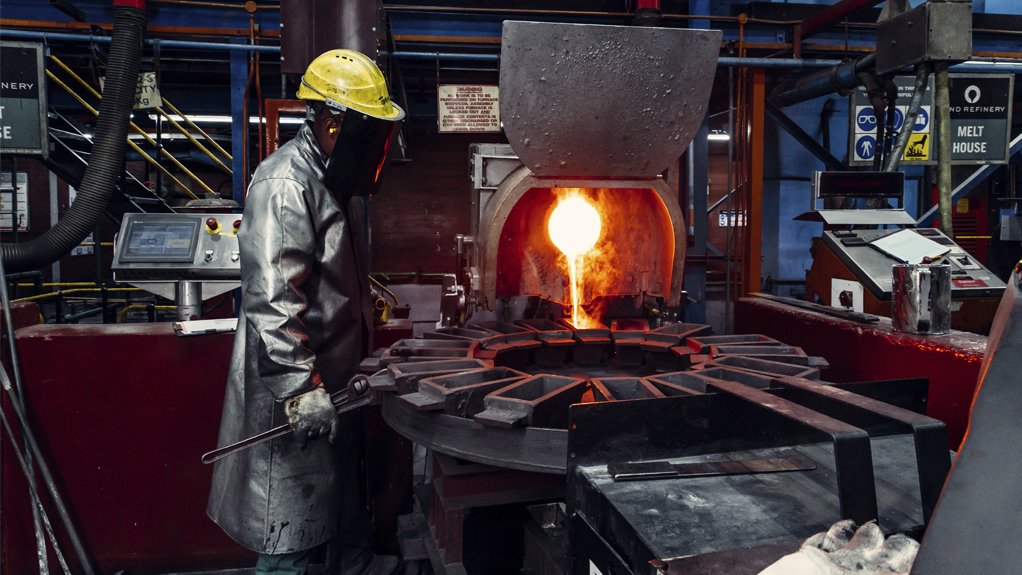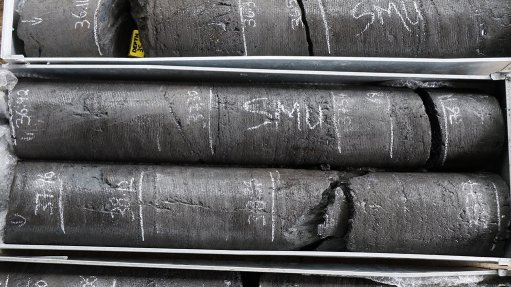Precious metals refinery hones efficiency initiatives



LOWERING POWER CONSUMPTION Rand Refinery has taken a multi-pronged approach to reducing energy consumption, including deploying energy-efficient lighting, variable-speed drives, high-efficiency equipment and power factor correction systems
PRAVEEN BAIJNATH The nature of the business lends itself to recycling initiatives, as this makes good business sense
As Africa’s only London Bullion Market Association Good Delivery-accredited precious metals refinery, Germiston, South Africa-based Rand Refinery is implementing initiatives to enhance its energy efficiency, improve water stewardship, lower emissions and build on resource efficiency.
In terms of water management initiatives, the refinery started its water sustainability journey by investing in water monitoring technologies across key operational areas to detect and track leaks, and replace faulty pipework, the latter initiative also seeing the above-ground relocation of water pipes for easier maintenance and visibility.
Rand Refinery’s water storage capacity was also bolstered by a further 1.25-million litres being approved and currently under installation to enable water harvesting and emergency supply.
Together, says Rand Refinery CEO Praveen Baijnath, these systems will provide up to ten days of uninterrupted water supply, without requiring external input.
Complementing this infrastructure, awareness campaigns were rolled out to educate employees on water conservation practices, particularly around showers, equipment washing and other water-intensive activities.
The second phase of the water programme focuses on recycling and effluent reduction, enabling the company to lower its freshwater intake while increasing recovery efficiency.
“The nature of the business lends itself to recycling initiatives, as this makes good business sense. Our mindset of ‘no milligram of valuable product to leave this site’ drives our urgency in reuse and recycling initiatives,” he adds.
These water initiatives have significantly reduced water intensity for every unit of production across three key operational areas.
In parallel, water stewardship has emerged as a priority area, notes Baijnath, adding that Rand Refinery has tackled water use and leaks, resulting in a substantial reduction in its water footprint.
Through operational improvements and the installation of water management systems, Rand Refinery has surpassed its 22% water-savings target by reducing consumption from a baseline of 72-million litres in 2022 to 55.16-million litres by this year, reinforcing its commitment to resource efficiency and climate resilience in a water-scarce region.
Looking ahead, Baijnath says Rand Refinery aims to achieve zero effluent discharge by 2030, with a chemical purification project scheduled to start in 2026, for which preliminary laboratory tests have yielded “promising results”.
In the final phase of its water stewardship initiative, Rand Refinery will launch an intense water harvesting programme, creating a self-sustaining water body and treatment system.
“If executed successfully, this could not only eliminate freshwater intake but also alleviate regional water scarcity, with potential for broader community impact,” he informs Mining Weekly.
Energy Efficiency, Decarbonisation
Being an energy-intensive operation, Rand Refinery has taken a multi-pronged approach to reducing energy consumption, with key developments including the deployment of energy-efficient lighting, variable-speed drives, high-efficiency equipment and power factor correction systems.
The refinery’s energy consumption is tracked using monitors and overseen by a dedicated energy management team.
Rand Refinery’s flagship energy project is a R75-million investment in a 4.5 MW solar PV system, implemented in two phases and fully commissioned and optimised as of February this year.
“The solar PV plant has significantly reduced energy intensity in both refining and fabrication operations.”
This investment has already delivered tangible benefits, with the company achieving an electricity saving of almost 24% by 2024, from a 2021 baseline, and contributing to more than 8 500 t of CO2 decarbonisation savings.
“As a consequence of these investments and deliberate strategies, the refinery and fabrication resource intensities per ounce of refined and fabricated product have also reduced by 60% to 80% from the 2021 baseline,” says Baijnath.
The next step in its renewable-energy journey, for which feasibility assessments have been completed, involves the installation of an additional 1 MW to 2 MW of renewable energy, which Baijnath advises will fully decarbonise refinery and fabrication operations.
These projects aim to reduce Rand Refinery’s carbon footprint by over 13 000 t of CO2-equivalent emissions by 2030, even with the addition of new plants.
On the emissions front, although Rand Refinery has an “impeccable emissions record”, Baijnath points out that the company is taking active steps to enhance air quality monitoring and management.
A gas monitoring system is currently being installed to track CO2 and other airborne emissions in real-time, providing a critical layer of transparency and responsiveness.
Plans are also underway to extend this monitoring capability to the four remaining emissions stacks, as part of a broader investment in advanced abatement technologies designed to further mitigate environmental impact.
Article Enquiry
Email Article
Save Article
Feedback
To advertise email advertising@creamermedia.co.za or click here
Announcements
What's On
Subscribe to improve your user experience...
Option 1 (equivalent of R125 a month):
Receive a weekly copy of Creamer Media's Engineering News & Mining Weekly magazine
(print copy for those in South Africa and e-magazine for those outside of South Africa)
Receive daily email newsletters
Access to full search results
Access archive of magazine back copies
Access to Projects in Progress
Access to ONE Research Report of your choice in PDF format
Option 2 (equivalent of R375 a month):
All benefits from Option 1
PLUS
Access to Creamer Media's Research Channel Africa for ALL Research Reports, in PDF format, on various industrial and mining sectors
including Electricity; Water; Energy Transition; Hydrogen; Roads, Rail and Ports; Coal; Gold; Platinum; Battery Metals; etc.
Already a subscriber?
Forgotten your password?
Receive weekly copy of Creamer Media's Engineering News & Mining Weekly magazine (print copy for those in South Africa and e-magazine for those outside of South Africa)
➕
Recieve daily email newsletters
➕
Access to full search results
➕
Access archive of magazine back copies
➕
Access to Projects in Progress
➕
Access to ONE Research Report of your choice in PDF format
RESEARCH CHANNEL AFRICA
R4500 (equivalent of R375 a month)
SUBSCRIBEAll benefits from Option 1
➕
Access to Creamer Media's Research Channel Africa for ALL Research Reports on various industrial and mining sectors, in PDF format, including on:
Electricity
➕
Water
➕
Energy Transition
➕
Hydrogen
➕
Roads, Rail and Ports
➕
Coal
➕
Gold
➕
Platinum
➕
Battery Metals
➕
etc.
Receive all benefits from Option 1 or Option 2 delivered to numerous people at your company
➕
Multiple User names and Passwords for simultaneous log-ins
➕
Intranet integration access to all in your organisation



















